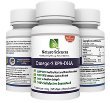Did you know that doctors often refer to pregnancies in women of 35 and older as “advanced maternal age”?
Sounds more like a diagnosis then a birthday reminder, right? No wonder that most women hate that term and leave it only for the medical community to use it.
While it’s true that advanced age means also advanced pregnancy risks, it’s all not that simple. What really matters is the age when a woman gets her FIRST child.
This means, women who are having a baby at the age of 40 or older but have given birth before, have lower birth risks than those giving birth for the first time who are under the age of 35.
What are the risks of becoming a mother after the age of 35?
Women of 35 and above do have increased risk of giving birth to babies with chromosomal disorders, such a Down syndrome.
Down syndrome is caused by an error in one of the early cell divisions and results in the presence of an extra copy of chromosome 21. In more than 90% of the cases, that extra chromosome 21 comes from the egg, meaning from the mother. Which makes sense, given that a vast majority of eggs of women in that age can’t build viable embryos any more. Luckily, there are ways to counteract this to an extent, but only if you start early enough and give your eggs and ovaries time to achieve their best form possible.
Women over 35 have an increased risk of early miscarriages, basically for the same reason as with Down syndrome: compromised egg quality. You can think of it like this: tired eggs and tired environment in which they are supposed to grow to a baby are at some point not fit enough as to sustain a new life over a time-course of nine months.
Miscarriages are a relatively common occurrence, affecting nearly 30% of all pregnancies of women over 35. Often they pass unnoticed, before a woman knows that she was actually pregnant. However, repeated miscarriages (usually defined by three consecutive first-trimester losses or two with one in the first trimester and one in the second trimester), suggest that there may be an underlying medical condition to take care of.
Women over 35 need longer time to become pregnant. Waiting can cause a lot of anxiety and put some unexpected pressures on the relationship, which is really nothing to underestimate.
In pregnant women over 35, there is an increased risk of gestational diabetes, gestational high blood pressure (which leads further to over-monitoring pregnancy and birth, having a C-section etc.)
As the matter of fact, if you ask medical doctors, they will add multiple births to the risk-list, as another risk factor of pregnancy at an advanced age. However, I know that when I talk to women over 35 (especially those who are in fertility treatments), it often turns out that they wish nothing more then to get pregnant with twins, as they know that a chance to have another child may not come again.
I know, all that does not sound encouraging, but at least I can add that there are many positive aspects of becoming a mother after 35, too!
Most babies born to women over 35 are fit and healthy.
To this, parents have often achieved emotional and finacial stability as well as above-average education. While this may not make a difference to a newborn whose world is limited to his mother’s breast, older children do profit tremendously on all levels if they are born to the families with more resources available.
Most older parents tend to have more patience, which is only partially true for my family (I am the one who is not very patient and in the nights of disrupted sleep, every now and again and again I say things which make me feel bad afterwards).
Apparently the children born to women over 35 spend less time in jail and have a greater chance of graduating from highschool. I very much hope that the statistic was done well in those studies and will work for me I all the situations in which I am not sure how to educate next.
To summarize: if you are over 35 and wish to become a mother, go for it! Just make sure to be aware of the health risks and to address them from the beginning on – if you do it right, there will be many social benefits to follow.
See you soon, thanx for browsing around my blog,
Darja
Supplements which are scientifically proven to increase egg quality:
To know when you ovulate:














I like the fact that you’re honest about the risks of getting pregnant later in life. I think people need to go into this with their eyes open, but the positives also need to considered. Of course the baby would be appreciated and loved,and may get more personal attention than a child born into a family with multiple children. Odds are that a mature couple will also be more stable, both financially and emotionally. If you’re over 35 and want a baby, I think it’s definitely doable, especially with the help of sites like this.